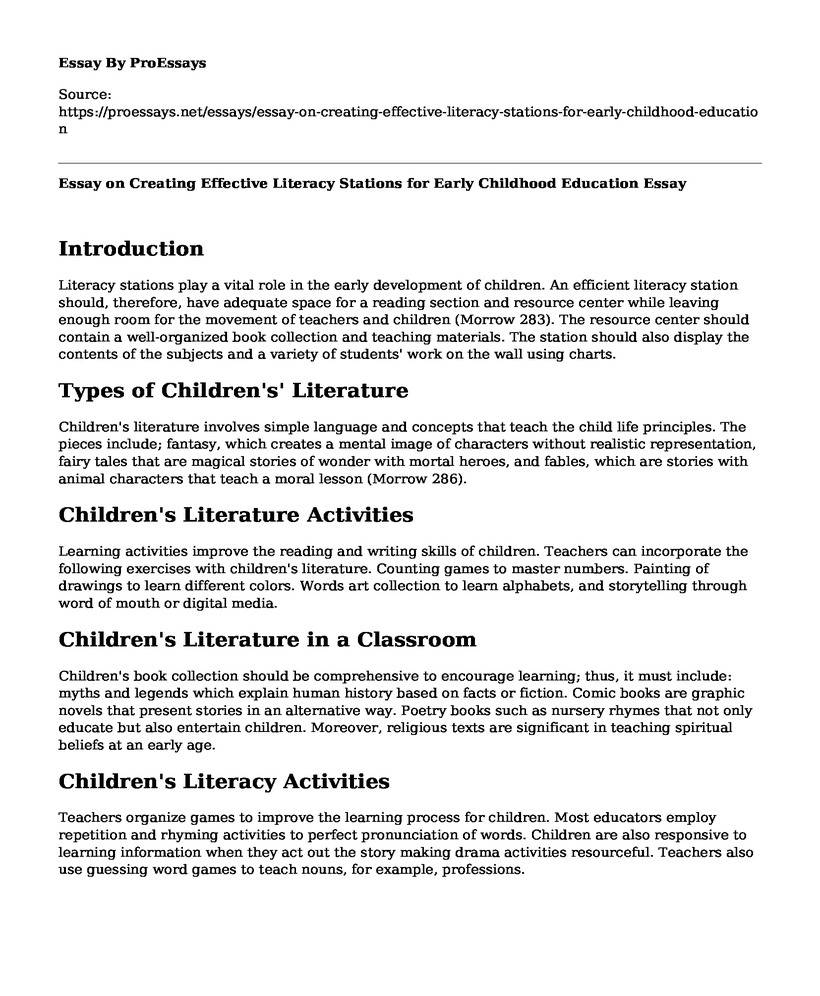Introduction
Literacy stations play a vital role in the early development of children. An efficient literacy station should, therefore, have adequate space for a reading section and resource center while leaving enough room for the movement of teachers and children (Morrow 283). The resource center should contain a well-organized book collection and teaching materials. The station should also display the contents of the subjects and a variety of students' work on the wall using charts.
Types of Children's' Literature
Children's literature involves simple language and concepts that teach the child life principles. The pieces include; fantasy, which creates a mental image of characters without realistic representation, fairy tales that are magical stories of wonder with mortal heroes, and fables, which are stories with animal characters that teach a moral lesson (Morrow 286).
Children's Literature Activities
Learning activities improve the reading and writing skills of children. Teachers can incorporate the following exercises with children's literature. Counting games to master numbers. Painting of drawings to learn different colors. Words art collection to learn alphabets, and storytelling through word of mouth or digital media.
Children's Literature in a Classroom
Children's book collection should be comprehensive to encourage learning; thus, it must include: myths and legends which explain human history based on facts or fiction. Comic books are graphic novels that present stories in an alternative way. Poetry books such as nursery rhymes that not only educate but also entertain children. Moreover, religious texts are significant in teaching spiritual beliefs at an early age.
Children's Literacy Activities
Teachers organize games to improve the learning process for children. Most educators employ repetition and rhyming activities to perfect pronunciation of words. Children are also responsive to learning information when they act out the story making drama activities resourceful. Teachers also use guessing word games to teach nouns, for example, professions.
Storytelling Techniques
Storytelling is one of the most effective teaching methods when applying the correct measures. A good storyteller should visualize the story and immerse the audience by creating mental pictures of the setting and characters (Morrow 297). The storyteller should integrate his or her life experience in the tale. Then establish the heroes and villains of the story to present moral lessons through their characters. The storyteller should always create suspense during the build-up and finish with a positive note for the audience.
Personal Storytelling Technique
I would use the integration of my personal story into the book to show the moral of the tale in real-life representation. Any experience that aligns with the book will illustrate a scenario that the children can relate to and believe. The children are likely to develop more interest in reading the book due to the real-life representation of my story.
Motivation Assessment
Developmental assessment of children can improve their performance in class when given the right motivation. Teachers use motivation assessment to get information on students' strengths and weaknesses, then provide them with feedback that enables them to achieve their full potential (Morrow 34).
A teacher can create a task-involved class environment where students help one another and work together during different projects to acquire comprehensive knowledge (Morrow 235). Teachers can encourage students to compete with themselves and try to better their performance. Self-evaluation is vital in learning and mastery of any subject. A student who knows his or her strengths and weaknesses can organize well the objectives to better their achievements. A good teacher and student relationship positively influence the performances of every student. The students will understand the lessons better and ask questions if necessary. The teacher also acts as a feedback loop that offers guidance and counseling when the students go astray.
Diverse Learners
After closely evaluating the performance and behavior of all students, it is key to plan the seating arrangement based on ability and behavior. The seating plan will ensure the availability of moral models and brilliant students who positively influence other students. Content selection, teaching technique, and testing should also be all-inclusive. Students have a different understanding of knowledge and skills. Therefore, they should get comprehensive information. During lessons and exams, students can express their learning through their perspective.
My colleague and I agreed on the significance of a planned seating arrangement to meet the need for a diverse class. However, we had different opinions on content selection due to the required standard curriculum for all students to ensure a "fair" evaluation of performance during common examinations.
Works Cited
Morrow, L. M. Literacy Development in the Early Years: Helping Children Read and Write. Pearson Education, 2020.
Cite this page
Essay on Creating Effective Literacy Stations for Early Childhood Education. (2023, Jun 11). Retrieved from https://proessays.net/essays/essay-on-creating-effective-literacy-stations-for-early-childhood-education
If you are the original author of this essay and no longer wish to have it published on the ProEssays website, please click below to request its removal:
- Should Children Carry Cellphones in School? Essay
- Essay on Teaching & Learning: Two Intertwined Processes for Effective Communication
- Essay Sample on Nurturing Great Minds: The Value of Early Childhood Education
- Essay Example on Engaging Students With Special Needs: Strategies for Active Learning
- Paper Sample on Teachers: Strategies to Help Students Achieve Top Grades
- Essay Sample on Developing an Ethical Model for the Foster Care System
- Date Three Days of Eye Sight - Essay Sample







